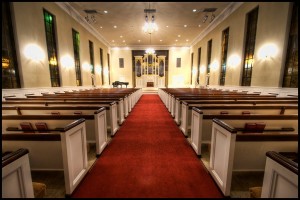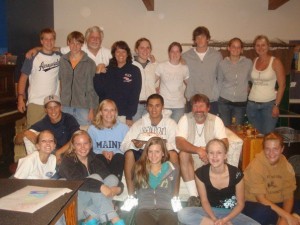[As usual, I’ll add a preface to my blogpost: I believe we could do a better job as an institution at ‘marketing’ the reality of what our campus offers to its student body. This is not unusual for most colleges and universities across the country; marketing often takes place without much student input and does not always offer the whole scope the experience. However, I believe that prospective students should have a good grasp at what they’re walking into; the gap between form and reality can create disillusionment that probably contributes to retention/graduation rates and such. So for the rest of my time here, I’ll try to focus on different aspects of the Puget Sound experience for students, both prospective and current. All these posts are just from my point of view.]
Our generation is growing up amidst an unprecedentedly-conflicted society in terms of its relationship with religion and spirituality. Though the news headlines are cluttered with pro- and anti-Christmas propaganda, athletic performers absurdly elevated as icons of divine intervention [i.e. image above] and the shameless politicization of faith, all these instances stem from underlying societal issues. In this country, we recognize the separation of Church and State in principle but counter it often in practice (for instance, on our currency and the Pledge of Allegiance). Candidates for public office face a religious litmus test every time they take to the podium/pulpit, though one can glean a bit of optimism from the rise of Mitt Romney, a professed Mormon, into the spotlight of Republican politics despite his party’s base being founded upon the platform of Evangelical Christians. However, even Romney holds back and refrains from talking much about his specific religion, speaking in an abstract manner about aspects of his faith that resonate with the Christian Right. On a national level, religious and spiritual life is enduring an interesting era as its complexity continues to grow, bereft of any comforting simplicity that once was available.

So what does that mean for religious and spiritual life at Puget Sound? And more importantly, what is the experience like for the student who enters with a personal religious identity? Or without one? Well, for one, I refuse to assume that the experience I have encountered in any way is similar to what others have; actually, I’m sure many would disagree. But the only narrative we have to offer with any sense of authority is our own, so I’ll do best to describe my own path through Puget Sound’s religious and spiritual culture (here is portion of the school’s site devoted to this area).
As a freshman, I stepped onto campus not sure of what to expect when it came to religion. I grew up in a family that had always allowed me to choose my own spiritual path, which I continue to be more appreciative of each day. At age 11, I asked if we could start going to church. After trying out numerous churches in our small town, we finally decided on a Presbyterian Church that immediately felt like home. A major part of that was the Youth Group that I participated in; it became a second family of brothers and sisters.

We created and participated in our own contemporary worship each Wednesday. We went to religious concerts every now and then, along with some memorable retreats. We went on a mission trip to Tijuana, Mexico. And really, we just hung out. It was relaxed, comfortable and subtly foundational. My experience with my Youth Group symbolized my own faith; it was a comfortable, subtly foundational part of my identity.
When I arrived at Puget Sound, the absence of that comfort was immediately noticeable. Being swept into varsity baseball, academics and a work study job, time was at a premium. Further, I didn’t really know where to look for what I used to have, or if I even wanted to. Looking back, there were numerous opportunities that I bypassed. I tried out a few different places, including a student-led contemporary service called Lighthouse (which I still attend from time to time) and a few three-mile walks to a local Presbyterian Church near Stadium High School. But for the most part, my religious participation in-person waned as I got older.
More importantly, though, I became very interested in the study of religion as an academic subject. I took a class that chronicled the history of Christianity my freshman year and was fascinated by the story of my own faith. That led to the study of other faiths, from different perspectives. Obviously, a lot of my assumptions were challenged and I encountered some secular viewpoints that were incredibly persuasive. I studied religion as a history, the Bible as a work of literature and the commercialization of contemporary religion in America.
But the more I broadened my religious worldview, the more mature my personal faith became. In an essay on friendship, Ralph Waldo Emerson wrote that we should not “treat friendships daintily, but with roughest courage.” My relationship with my faith endured a similar experience, and grew far more resolute because of it.
So that’s my [brief] story. Here are my hindsight thoughts about religious and spiritual life at Puget Sound:
1. It is a quiet, but present, community. Compared to other communities at Puget Sound [Greek, Athletics, etc.], the religious/spirituality community is much less known. People tend to keep their own convictions to themselves more often than not, or do not have a particular belief or religious upraising. Indicative more so of our generation than anything else, religious disinterest and atheism is definitely a presence on campus–which is awesome. The Puget Sound community offers a vibrant diversity of religious viewpoints and perspectives. There are conservative groups and liberal groups, numerous different traditional faiths, some more recent religious traditions (such as Baha’i) and, as noted earlier, those who are either agnostic or atheist.
2. Religion/Spirituality is definitely discussed. From a recent student-led discussion about the tensions/reconciliation of LGBT-Q individuals and religion, to a recent article in The Trail articulating the difficulties of being atheist in our society, religious discussions are very present on campus. And though many would characterize the average Puget Sound student as “liberal,” there is still a substantial amount of students who would fall into the “moderate” or “conservative” category. These discussions do not always end in agreement, but I am particularly proud that the student body at Puget Sound is willing to engage with a topic that is uncomfortable for many.
3. Service as a uniting force. My junior year, Eboo Patel spoke on campus about the importance of utilizing service and social justice as a way to unite different religious groups. We have a department on campus called Spirituality, Service & Social Justice [SSSJ] that works ardently to achieve such a mission. I have seen the campus move towards this emphasis in recent years, and I sincerely hope that it continues to do so after I leave.
4. Professors that challenge without disrespecting. One of my big questions about coming to college was whether or not my faith would be questioned by others, especially professors and especially if I took religious courses. On the contrary, I have yet to have someone openly criticize my faith or ridicule the premises of any religious tradition. That is not to say that there aren’t students or professors who are devout atheists or think that religion is a man-made fantasy; however, I have never personally experienced disrespect on the grounds of my faith.
5. A tolerant community. If there is any belief/tradition that may feel unwelcome at Puget Sound, it would be a religious tradition that supports discrimination/intolerance of others on the basis of their identity. We have a campus that goes to great lengths to make all students feel as if they have a place on campus; if a certain faith isn’t okay with that, I don’t think it’ll find itself as comfortable here. But that doesn’t bother me much.
[I’m sorry that this was such an extensive post. I just feel as if this is a subject that isn’t talked about much in the context of prospective students, especially when it comes to getting a grasp of the current-student perspective. I came to Puget Sound with a quiet faith, and I leave with a similar one that has matured throughout the experience. I’m proud of the religious experience our school offers, but I recognize that it is not for everyone. For those who enjoy being surrounded by like-minded individuals in regards to their faith, Puget Sound might not be the place. But as I’ve expressed, I could not be more appreciative of the religious worldview I’ve attained in my years here, both from inside and outside the classroom. Everyone’s experience at Puget Sound is unique, so please feel free to contact the school and ask to be connected to other students, most of whom will gladly share their own experiences. Or if you have more questions for me, please free to e-mail me at mluther@pugetsound.edu]

